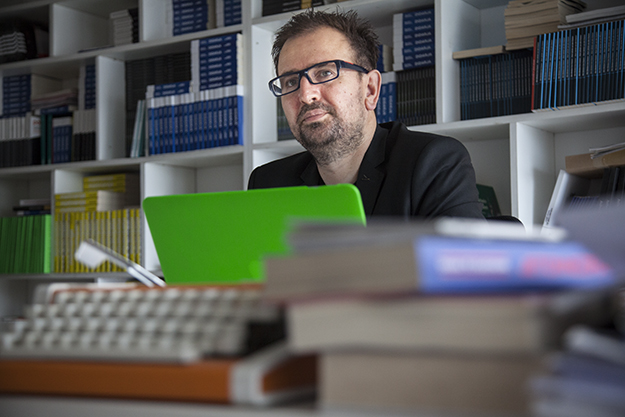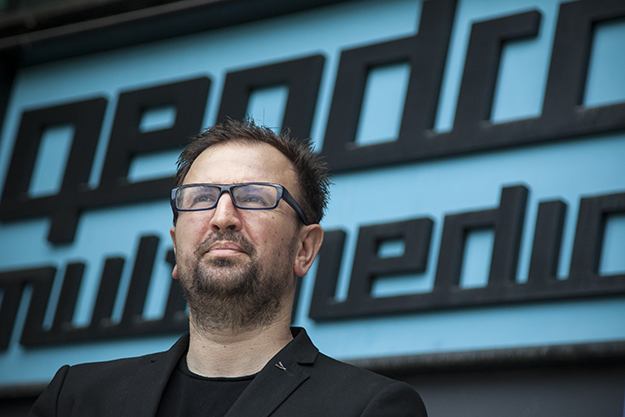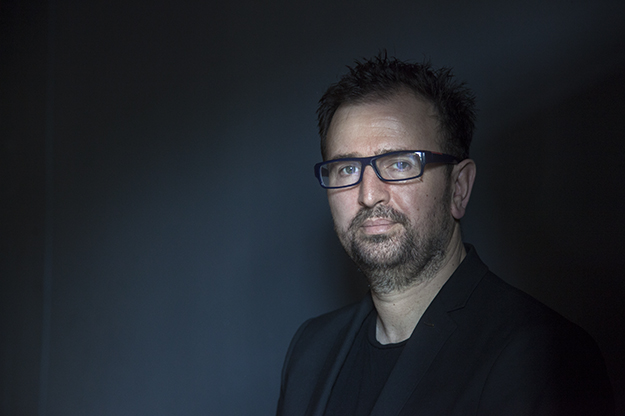For Kosovar playwright, Jeton Neziraj, a play needs to have a strong impact on its audience. “Something must change within them, just as something changes within the author when he writes the drama,” he proclaims. “I want them to be agitated, to feel pain, to feel hate, anxiety, enthusiasm, empathy, optimism or desperation.”
Neziraj has now attempted to coax these feelings out of the audience through more than 15 different plays. Some of his more recognised works include: “War in Times of Love,” “The Demolition of the Eiffel Tower,” “Yue Madeleine Yue,” “One Flew Over The Kosovo Theater,” “Bordel Balkan,” and his most recently performed work, “55 Shades of Gay.”
Many of Neziraj’s plays have aroused controversy, and touched on topics that still have an aura of sanctity, or of a hidden public shame in Kosovar society. An obsession with the influence of dictators and authoritarian states on the lives of ordinary people has recently been complemented with writing on religious fundamentalism, nationalism, racism, immigration and homophobia. “In general what I write can be considered political dramas, but I don’t stop there,” he says.
Neziraj believes the role of theater is to touch on important topics in society, and to become a space for dialogue, and artistic, social and political communication. In the long term, he feels that theater should have an emancipating role, but that can only be achieved if the plays have the aesthetic beauty to support a strong and important topic.
K2.0 caught up with Neziraj to discuss his work, especially his latest play, “55 Shades of Gay,” as well as what he strives to achieve with his writing.

Photo: Majlinda Hoxha / K2.0.
K2.0: Let’s start with your literary influences… Which authors contributed to your formation as a writer?
Jeton Neziraj: It is difficult to pick out just a few. But I do know that some authors have inspired, and continue to inspire me with their pieces. Among them I must mention [Gabriel Garcia] Marquez, [Franz] Kafka, Dino Buzzati, [Friedrich] Durrenmatt, [Eugene] Ionesco, [Ismail] Kadare, [Nikolai] Gogol and [Fyodor] Dostoyevsky. Naturally the list is much longer, but if I had to pick out just a few, I’d choose Ionesco, Marquez and Kadare.
Dostoyevsky was outstandingly inspirational for me, especially in my early days. Later when I found Marquez, I was astonished. He has probably influenced me most, in the sense that I started to see beyond the classic dramatic structure, and especially beyond the realist way of conceiving the dramatic theme. I feel that the spirit of magical realism suited my temperament and my perception of the world and society.
Kadare also continues to inspire me in many directions, as an outstanding storyteller, but above all, as a genius who tackles issues and problems which the Albanian society has faced in the last centuries, especially issues related to dictatorship.
Recently you have tackled the issue of nationalism in your play “Bordel Balkan,” which premiered in April. Why did you see this as important at this time? How do you feel nationalism is expressed in Kosovo?
This is a kind of Balkan syndrome. I can’t help but quote the famous saying “nationalism is a sanctum of scoundrels.” In every context, it is a weapon of the ignorant and the unknowledgeable, of people who realistically do not have the capacity to face problems in a more professional and humane way. Nationalism serves them as a side weapon, as an unnecessary, external weapon for fighting a phenomenon, be it to benefit personally in some way, or to achieve power, or to get a new job more easily, and so on.
In the context of Kosovo we know that Kosovar nationalism, or the nationalism that could be considered as healthy nationalism which we witnessed in the 90s, was understandable because in the circumstances of occupation it came as a defense mechanism, and a necessity for creating a new freedom for ourselves, so that we could function and survive. Whereas post-war nationalism was used only as an argument in the aforementioned context.
It has often been used in theatre as well. Nationalist themes have been used from certain artists to achieve something beyond artistic productions. Many artists want to be great creators, but they also want to be great patriots. So they use theatre to gain political credit. It is a dangerous and disgusting combination. The artistic productions that result from this serve neither the public nor the cause which they claim to serve.
Through your plays, do you aim to initiate social dialogues which you feel are being excluded, and which have social emancipation at their essence?
Yes. This is one of the long term objectives, because naturally you cannot claim to change the world or society through one play. But in the long term, this is the objective of these plays. They have an element of social emancipation.
What the public sees as shocking today — for example, two actors kissing or being naked — will not be seen as shocking in the future, because it will be a part of normality. It helps us, as artists who are involved in it, because it is an interesting experience, seeing where the problems of this community lie. It is in the interest of the people that see these plays, but also the society as a whole; others might read an article or see an actor speaking about one of these plays on TV.
So the message is conveyed, and what shocks many people today, when they see the poster or an image on the internet, will no longer shock them tomorrow. This is the outstanding benefit of a production of this nature, never mind the other benefits that theatre offers. Because you see a production that some like and some don’t, but others might like the music, or the acting, the movements, the script maybe — so it has an entertaining element as well.

Photo: Majlinda Hoxha / K2.0.
Moving on to your most recent play, “55 Shades of Gay,” which premiered on Sept. 8 and focuses on the LGBT community in Kosovo. One of the prevailing critiques regarding the play was its “provincial approach,” because it was more focused on shocking the audience — with its scenes and the homophobia that was exposed through them — than it was on tackling the deeper issues faced by the LGBT community.
You can never exhaust a certain issue through one play. We are talking about the first theatrical production of this nature, that is dedicated to this community or treats issues that the LGBT community face.
It was not my objective to delve deep into issues of the LGBT community. Rather, as is my style, I offered a kind of perspective towards LGBT issues that was more political, namely the way it is perceived by a homophobic society, and the way the LGBT community sees itself within the Kosovar context. Nevertheless, this play does not only refer to the Kosovar context, rather it has a more Balkan-oriented connotation.
The third point is more political I’d say. It is about how this community interacts with power — local and international power structures. When I say power structures, I am referring to people that are chosen to make laws for the LGBT community, the ones that control the budget and dictate policies related to this community.
As for the scenes that are seen by some as shocking or intended to shock, everyone has their own opinion and attitude, and in a way these type of scenes have become a part of my writing style as an author, and Blerta [Rrustemi-Neziraj]’s style as a director. So I have nothing more to say about that. For me it is important that we have received outstandingly good comments, especially by members of the LGBT community, whom I consulted occasionally beforehand. Even negative reactions are always welcome.
Do you think that the public considers two men holding hands or kissing on stage as something shocking?
Yes and no. In Prishtina maybe not so much, and not if it is in another context, in a play in which the focus is not on these issues or this theme, because as we know, we have had comedies in the past in which gay people were mocked and the audience was dying of laughter, just because two gay people touched each other on stage. In this case, the whole focus was on that — even the title says so — and the public came with a mountain of prejudice regarding what they were going to see. It was challenging for us as well, managing the situation, accommodating the interests of the public. But you can never manage the interests of everyone.
There is always one group of sociologists that consider discussions about certain themes as legitimate, and there is always a group of policemen who consider that they have been portrayed in a harsh or inadequate way, and always a group of young religious extremists who consider that the play aims to pollute the morals of our youth. It is a problem, and frankly we do not aim to accommodate different groups. Our objective is to extract a piece of reality — staged reality, naturally — which enables the public to initiate a dialogue, initially between us and the public, and subsequently among members of the public, starting from negative critiques to the fact that some people feel shocked.
I received the same comments after my Bordel Balkan play. Some people were not too happy with the content, not too happy with the prevailing violence in certain scenes, but these reactions are expected, and they are common for plays that have such a political nature.

Photo: Majlinda Hoxha / K2.0.
At one point it is mentioned that around 57 intellectuals signed a petition entitled “pro family and against homosexuals.” Why did you feel it was important to mention their names during the play?
During the process of writing a play of this sort, you are inclined to research about how it will be perceived, and how different groups will react. In this case I researched by using the internet, reading books, meeting people and communicating with them about this theme. During the research process I found this petition which I remembered from three or four years ago. I’m not sure when it was made exactly, but it was shocking for me to read the names of many intellectuals, writers and artists among the list of the undersigned in a petition of this nature, which used very denigrating language against the LGBT community.
It had a very fake, alarming nature. Of course it was completely unnecessary and fearmongering. It incited a sense of insecurity. It was extremely inciting for violence and hatred against this community. And the context of the play was such that it had space for a release of that nature.
I took the base of it and exaggerated and touched it up with a bit of irony, but the names are as they were. Obviously I did not take all 57 names. I chose some that were more representative, some that are known to people here and in Albania. I read that some of them reacted and explained that their names had been misused, however I am yet to see anything official.
The other point is that we used them in a play, in an artistic production, so in any circumstance, it remains at the level of an artistic projection. If they feel offended, let them be offended, if they actually signed it. Whereas those that have had their name misused, let them act and distance themselves publicly, if they really do want to share their disapproval of the petition.
In one of the scenes, a screen shows an imam preaching against LGBT persons. How do you see the presence of the most radical religious ideas in Kosovo?
From what I’ve followed and seen on the internet, there was a period in which these people became powerful in the sense of media, by using YouTube and other social media. It was a truly dangerous phase because they started to recruit people who obeyed those passages, which were taken completely out of the Kosovar context, were completely outdated and not in the spirit of the time in which we are living.
However, what I have noticed is that this type of discourse used by religious leaders – mainly leaders of the Islamic religion, naturally – has been toned down, not because they themselves have tone down, but rather because they have started to understand that what you post on the internet is public, and subsequently someone can hold your responsible.
As far as I know, because of these public posts, some imams have been held accountable before law enforcement institutions because of the language they used incites violence, hatred and endless homophobic elements. So naturally, when we picked this subject, we started researching religious perspectives regarding these issues.
It was not hard to identify some of the imams that were more aggressive in their YouTube presentations. We made a sort of collection, we placed them in the context of the play, and I believe that those images are expressed in the context in which they were placed. Naturally, the objective is for people to see how catastrophic the consequences of their words – which are seemingly in a religious context – can be, be it for society, for a certain group within society, or for the future of this country.

Photo: Majlinda Hoxha / K2.0.
Is making plays like these a display of artistic courage or artistic responsibility?
Some artists prefer to find themes that are easier, which are implemented without a headache, without bothering anyone, having all kinds of people attend and ultimately leave the hall satisfied and entertained, they are content with this.
Others seek more from theatre, because theatre offers this opportunity. They research subjects which are a bit taboo, or are oppressed by society because society does not want to face them. These subjects are like wounds. If you treat them, they hurt, but in the long term, they heal. These are subjects which hurt us when we see them in theatres. We do not want to face these subjects, but they have an effect which I call “therapeutic.”
Responsibility is then involved in the phase in which you begin to shape a certain theme, and you start to ask yourself about what you want to communicate through that theme. Theatrical productions that take the side of the victim, even when they are propaganda productions, are always justified. As long as you are in the position of the oppressed, the minority or the victim, then you are okay to tackle an issue as you see fit. In this regard, with the LGBT issue, we are naturally careful not to present this community as victimized, however when you analyze the play as a whole, this is implied.
It is often said that we lack creators. How can this change?
As far as I can see, it is almost a global crisis. The arrival of internet as a new medium has created a group of people who feed themselves artistically in other social forms, solely from the internet, and not from literature, cinema, theatre or mediums that I would say are more substantial.
In our context, I would initially speak about the quality of education. It is an essential basis. Take for example the faculty of arts: the level of education, especially in the field of theatre, is beyond scandalous. Seeing everything, from the way students are admitted, to the people who teach those students, naturally you cannot expect results.
Geniuses surface, because they surface even in circumstances in which they have no school or professors. However, geniuses can also be created when there are good conditions and when we have a system that stimulates people to be creators.
I am mainly referring to the field of theatre in Kosovo, and in Albania, where it is even worse. The theatrical infrastructure is ruined. Throughout Kosovo, within a year, we do not produce more than twenty plays, from which ten to thirteen are made using scripts written by foreign authors, six or seven are from Albanian authors, three or four are from traditional authors, and only two or three are left as plays that are made from contemporary authors.
How can an author who is not in continuous contact with the public and whose plays are not theatricalized continuously test him or herself and remain active? So it is a problem of the education system and of the way our theatres function. But it is also a problem related to the cultural destitution that has dominated throughout the post-war period.K
“55 Shades of Gay” is playing at the Oda Theater in Prishtina on Oct. 6 and The National Theater of Albania in Tirana on Oct. 18.
“Bordel Balkan” plays at the National Theater of Kosovo in Prishtina on Sept. 25.
Feature image: Majlinda Hoxha / K2.0.

